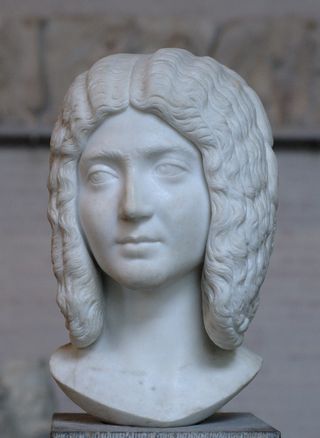Empress Julia Domna: Difference between revisions
| Line 18: | Line 18: | ||
<span style="color:#000000;">'''Behavior:''' What words can best be conjured to describe an immortal empress nearly two thousand years old? The first would be reserved, as Julia Domna holds the world at bay with a calm that is centuries deep. Intelligent would be another word, but genius would better describe her brilliant wit and encyclopaedic familiarity with nearly all forms of intellectual pursuit known to humanity thus far. Sardonic might also be apt, for she has seen nearly every variation of human failing since her first life and it is clear in the metallic prisms of her eyes that she is more than a bit jaded with ennui. And of course, sad, for she bears a wistful air that seems to ward off the youthful and the lighthearted, but which grants her a grim dignity that calls out to those who have themselves known tragedy, and draws such kindred spirits to her like moths to a flame. | <span style="color:#000000;">'''Behavior:''' What words can best be conjured to describe an immortal empress nearly two thousand years old? The first would be reserved, as Julia Domna holds the world at bay with a calm that is centuries deep. Intelligent would be another word, but genius would better describe her brilliant wit and encyclopaedic familiarity with nearly all forms of intellectual pursuit known to humanity thus far. Sardonic might also be apt, for she has seen nearly every variation of human failing since her first life and it is clear in the metallic prisms of her eyes that she is more than a bit jaded with ennui. And of course, sad, for she bears a wistful air that seems to ward off the youthful and the lighthearted, but which grants her a grim dignity that calls out to those who have themselves known tragedy, and draws such kindred spirits to her like moths to a flame. | ||
<span style="color:#000000;">'''History:''' | <span style="color:#000000;">'''History:''' With the assassination of her son Caracalla, the empress considered taking her own life rather than be hunted by Emperor Macrinus. But in that darkest hour an agent of the Kabeiroi presented himself and offered an alternate option, immortality. But it required that the empress fake her own death for the court at Rome. Julia Domna, agreed and had the body of one of her oldest maids mummified and buried in the Mausoleum of Augustus before she an her immortal guide secretly made their way to Samothrace where the empress underwent the Rite of Immortality within the Greater Labyrinth of the Cabiri. The rest they say is history, as Julia awakes periodically and walks the earth in her personal search for her husband's missing head and rumors of the souls of her two dead sons. | ||
<span style="color:#000000;">'''Recent Events:''' Julia Domna has only recently awakened into this age and having found her native Syria consumed by a fanatical Muslim government, has chosen Beirut, always one of her favorite cities as her current residence. But the dark happenings in Sardinia, the whispers of the dead and her innate intuition have given Julia a sense that awakening in this time and her presence in Beirut are anything but coincidence. She has recently begun to investigate the disappearance of mortals and wraiths in Beirut that has been characterized by a mephitic miasma that is not so much a smell as a spiritual taint. That trail has led her to a small sea-side hotel in the old city of Beirut. If her divinations are to be trusted, then something ancient, evil and powerful has crossed over into the lands of the living. As such, she has sent out missives to those Cabiri who are currently awake and conferred with those still in the Underworld on this matter. Julia knows she has very little time in which to thwart this unnamed malignancy before it metastasizes into a supernatural cancer fatal to the mortal world. | <span style="color:#000000;">'''Recent Events:''' Julia Domna has only recently awakened into this age and having found her native Syria consumed by a fanatical Muslim government, has chosen Beirut, always one of her favorite cities as her current residence. But the dark happenings in Sardinia, the whispers of the dead and her innate intuition have given Julia a sense that awakening in this time and her presence in Beirut are anything but coincidence. She has recently begun to investigate the disappearance of mortals and wraiths in Beirut that has been characterized by a mephitic miasma that is not so much a smell as a spiritual taint. That trail has led her to a small sea-side hotel in the old city of Beirut. If her divinations are to be trusted, then something ancient, evil and powerful has crossed over into the lands of the living. As such, she has sent out missives to those Cabiri who are currently awake and conferred with those still in the Underworld on this matter. Julia knows she has very little time in which to thwart this unnamed malignancy before it metastasizes into a supernatural cancer fatal to the mortal world. | ||
Latest revision as of 12:53, 8 November 2014
- Story 29 - Bellum Horarium -x- Cabiri -x- Beirut
The Early 3rd Century C.E.
The 21st Century C.E.
The Roman Empress
Epitaph: "Hence no one could, in the light of her career, regard as happy each and all who attain great power, unless some genuine and unalloyed pleasure in life and unmixed and lasting good fortune is theirs. This, then, was the fate of Julia. Her body was brought to Rome and placed in the tomb of Gaius and Lucius. Later, however, both her bones and those of Geta were transferred by her sister Maesa to the precinct of Antoninus."
-- Cassius Dio
Sobriquet: Julia. Empress. Augusta. Mater Castrorum (mother of the camp).
Appearance: Julia Domna is a woman of slight stature, weighing no more than one hundred pounds and five-foot-three inches tall. She has a swarthy complexion that quickly darkens with exposure to the sun. Her hair is long, hanging to the blades of her shoulders and naturally dark, but without dye it is shot with gray streaks. As a general rule, the empress does keep her hair dyed dark which easily takes ten years away from her countenance. Julia's face is one of classical middle-eastern beauty, but she has dark gray eyes, like crystallized iron and an ageless beauty that suggests both severity and suffering. These two traits combined with her slim, some would say waif-like body, causes an almost instantaneous infatuation in both sexes of which Julia seems to be unconscious.
At other times, the Augusta obviously and consciously uses her beauty to great and specific effect, though it does not seem to give her any personal pleasure. The mother of the ancient Roman legions, prefers to garb herself in the clothing of whatever age she awakens into, but she wears that clothing with a restrained classical style that always sets her apart from the mortals she associates with. As she has every right to do so, Julia always wears some article of cloth stained with the royal purple and jewelry bearing amethysts. With the proper cosmetics and the right attire, the empress can pass herself off as woman ten to fifteen years younger than her nearly five decades would suggest. Alternately, when she wishes to avoid attention, at least of a carnal nature, she can use artifice to age herself a good twenty years and become a matronly grandmother of nearly seventy years.
Behavior: What words can best be conjured to describe an immortal empress nearly two thousand years old? The first would be reserved, as Julia Domna holds the world at bay with a calm that is centuries deep. Intelligent would be another word, but genius would better describe her brilliant wit and encyclopaedic familiarity with nearly all forms of intellectual pursuit known to humanity thus far. Sardonic might also be apt, for she has seen nearly every variation of human failing since her first life and it is clear in the metallic prisms of her eyes that she is more than a bit jaded with ennui. And of course, sad, for she bears a wistful air that seems to ward off the youthful and the lighthearted, but which grants her a grim dignity that calls out to those who have themselves known tragedy, and draws such kindred spirits to her like moths to a flame.
History: With the assassination of her son Caracalla, the empress considered taking her own life rather than be hunted by Emperor Macrinus. But in that darkest hour an agent of the Kabeiroi presented himself and offered an alternate option, immortality. But it required that the empress fake her own death for the court at Rome. Julia Domna, agreed and had the body of one of her oldest maids mummified and buried in the Mausoleum of Augustus before she an her immortal guide secretly made their way to Samothrace where the empress underwent the Rite of Immortality within the Greater Labyrinth of the Cabiri. The rest they say is history, as Julia awakes periodically and walks the earth in her personal search for her husband's missing head and rumors of the souls of her two dead sons.
Recent Events: Julia Domna has only recently awakened into this age and having found her native Syria consumed by a fanatical Muslim government, has chosen Beirut, always one of her favorite cities as her current residence. But the dark happenings in Sardinia, the whispers of the dead and her innate intuition have given Julia a sense that awakening in this time and her presence in Beirut are anything but coincidence. She has recently begun to investigate the disappearance of mortals and wraiths in Beirut that has been characterized by a mephitic miasma that is not so much a smell as a spiritual taint. That trail has led her to a small sea-side hotel in the old city of Beirut. If her divinations are to be trusted, then something ancient, evil and powerful has crossed over into the lands of the living. As such, she has sent out missives to those Cabiri who are currently awake and conferred with those still in the Underworld on this matter. Julia knows she has very little time in which to thwart this unnamed malignancy before it metastasizes into a supernatural cancer fatal to the mortal world.
http://biography.yourdictionary.com/the-julias-of-rome
http://womenandphilosophyproject.blogspot.com/2013/03/julia-domna-philosopher-julia.html
http://link.springer.com/chapter/10.1007/978-94-009-3497-9_8#page-1

